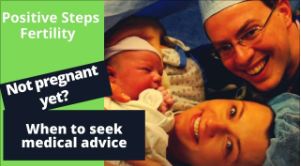When a couple is trying to conceive, one of the most common questions we hear is: “can stress cause infertility?”
It’s easy to fall into a vicious cycle of feeling stressed, becoming stressed about the fact that you’re stressed, and the built-up anxiety becomes a difficult hurdle for anyone to overcome. However, while stress is certainly an important issue to address, in terms of fertility, it’s less of a factor than most people believe. This is not to say that stress cannot or does not play a role, only that stress alone does not amount to infertility.
Can stress stop you from getting pregnant?
The relationship between stress and conception isn’t exactly clear. It’s obvious that extreme stress can negatively impact your body, but it’s unclear whether the effects are significant enough to affect your fertility. While some research has shown that psychological stressors like job loss and divorce can impact a man’s sperm count and quality of semen, other studies haven’t found this not to be true. However, these results could be skewed because men experiencing severe stress often have other health issues (like obesity).
If you look at how stress affects fertility, there are a couple of considerations:
- If you are so stressed you don’t have a period, it is really hard to get pregnant.
- If you or your spouse is so stressed that you start fighting with each other, you might stop having sex, and then you definitely won’t get pregnant. That is also pretty detrimental.
The good news is that if you’re aware of the effects of stress, some of those issues can be fixed. For lack of periods, as an example, you can take medication to induce a period. Also, a doctor can give progesterone support for extreme cases of stress for dysfunction. This ties into a concept called the female athlete triad, technically known as hypogenetotropic hypogonatism.
To address the lack of sex due to fighting and stress, a solution might be to seek psychological support and relationship counseling.
Can Stress Cause infertility?
Speaking to the lack of clarity in the relationship between stress and conception, one study showed the most stressed people were the most likely to get pregnant. The reason was the participants who were laissez-faire about pregnancy simply let nature take its course. They didn’t do anything about their subfertility (any form of reduced fertility with prolonged time of unwanted non-conception). These couples were less likely to get pregnant than some of the “stressed” couples who took the initiative to make things happen, and acted on it.
Sometimes family members who have had successful pregnancies will give you unwanted advice about stress and conception. They usually say things like, “Take a vacation, get some candlelight and a glass of wine. You’ll be more relaxed, and then you will get pregnant.”
But taking a vacation won’t open up blocked fallopian tubes, and a glass of wine will not fix the man who is not producing sperm. Family and friends typically have the best intentions, but a lack of knowledge can lead a couple to more stress with no conception.
Infertility and the myriad factors involved in conception (including stress) is best assessed by a fertility specialist than advice from friends and family. It’s important to have testing that accurately tells you where your body is at but also reassures you that it most likely wasn’t your stress causing fertility issues– which is the case for most women.
If you’re having trouble getting pregnant and think your stress levels might be contributing to it, it may be worth talking with a fertility specialist who can assess the true root of the issues. Is it time to see a fertility specialist? Read more here.
The best advice: Don’t suffer in silence. Get help. Get peace. Reach out to a specialist.




